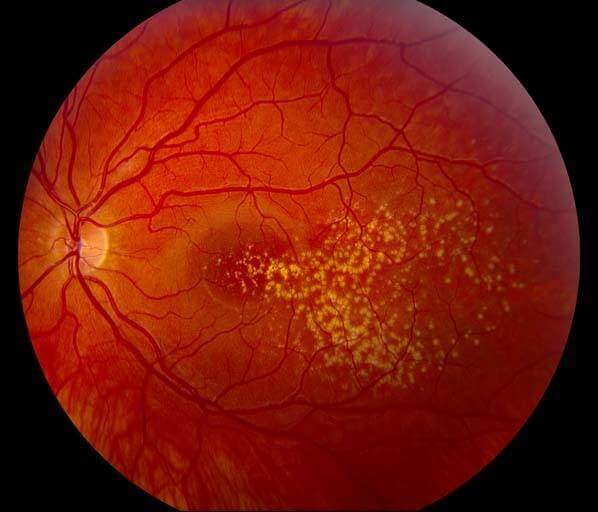
Retinal Photo documentation of your optic nerve, blood vessel, and the macula (fovea) is used to study and compare changes over time.
Why is a healthy retina so important for overall vision and wellness? Unhealthy retinas are not capable of sending clear signals to your brain which can result in vision loss or impairment. There are many retinal conditions and diseases, but most can be treated when they are found early. Comprehensive eye exams are able to detect problems with the retina early-on to help you avoid serious diseases and complications. We recommend you visit your eye doctor annually or biannually to keep your eyes healthy. With retinal problems, you may not notice any symptoms even when a retina is threatened. Your retina has no nerve endings so you may not feel any pain and may continue to see sharply even though your retina is impaired. Problems with your retina can be a result of the following conditions or diseases:
- High Myopia
- Retinal Detachment
- Diabetic Retinopathy
- Age-related Macular Degeneration
- Glaucoma or Hypertension
Retinal Problems
Did you know that there are at least 29 retinal problems that could occur if you don’t keep your eyes healthy? A common retinal problem some people experience is retinal detachment. The American Academy of Ophthalmology tells us that the middle of our eye is filled with a clear gel called vitreous. Tiny clumps in this gel may form, casting shadows on our retina, and causing us to see floaters. Other times, this gel may shrink, pulling on the retina a bit. That could cause us to see flashes or to be “seeing stars”. These are common instances and do not generally do us any harm. However, if the vitreous—or the clear gel—moves too far away from the retina, it can tear the retina, allowing fluid to leak into the tissue. This will cause the retina to detach from the back of the eye much like wallpaper that is peeling. Your retina cannot send proper signals to the brain and your vision will become blurry. This can lead to blindness quickly if left untreated.



Diabetic retinopathy is another common condition, but usually only occurs in those who have diabetes. Diabetes can damage blood vessels in the eyes over time, causing them to leak blood or fluid, which will, in turn, cause the retina to swell. This will cause blurry vision and must be treated to regain that vision.
Macular degeneration is one of the leading causes of blindness in people. The macula is the retina’s central part that receives images and focuses vision, where the information will then be sent to the brain. Macular degeneration is the deterioration of the central part of the retina vital to clear vision. Dark spots in your vision will begin to appear until blindness sets in. There is no cure for this, but you can protect your eyes by wearing proper prescription-grade sunglasses and indoor glasses to protect your eyes from blue light (such as from phones, TVs, and other electrical devices).
Glaucoma causes fluid buildup in the front part of your eye, which will then put pressure on the optic nerve. In many cases, the optic nerve will be damaged and electrical impulses cannot be sent properly to the brain, resulting in blurry vision or blindness. The good news? Glaucoma can be treated and blindness can be prevented with early treatment. Hypertension is closely tied to glaucoma, as it usually causes glaucoma to set in. Ocular hypertension is when fluid does not properly drain in the front part of the eye, causing that buildup and pressure that will eventually damage the optic nerve.
